Extending privilege featuring Valerie Rockefeller and Henry Ford III
Transcript
[Legacy and justice. Henry Ford, the third, trustee, Ford Foundation. A middle-aged white man with blond and gray hair. Valerie Rockefeller, chair, Rockefeller Brothers Fund. A tall white woman wearing a shades-of-blue-striped knit dress with blue boots. David Callahan, founder and editor, “Inside Philanthropy”. Author, “The Givers”. A white man wearing a black sports jacket and blue shirt.]
ANNOUNCER: Please welcome Henry Ford the third, Valerie Rockefeller, and David Callahan. [applause]
DAVID CALLAHAN: So, let me just say, this is really cool. In my world of covering philanthropy every day, two names, of course, loom very large: Ford and Rockefeller. And it’s not every day that I get to talk to both a Ford and a Rockefeller at the same time, and my guess is it’s probably not every day that a Ford and Rockefeller get to talk to each other.
HENRY FORD THE THIRD: No.
VALERIE ROCKEFELLER: We just met today.
HENRY FORD THE THIRD: Yeah.
[laughs]
DAVID CALLAHAN: And I think it’s a timely conversation, because right now there are a lot of families in America sitting on a lot of money, and they’re having conversations about how things are going to play out with philanthropy, how they’re going to play out in the next 10 years, the next 20 years, the next 50 years. And so, who better to get some advice from, uh, than, than people from two families that have been at this for a very long time and have a lot to share. Henry, I want to start the conversation with you and ask you about the kinds of conversations that have been happening in the family around philanthropy.
HENRY FORD THE THIRD: Our family has sort of been thinking about philanthropy for as long as I can remember, but the conversation has changed a little bit over the past couple years, and I didn’t necessarily have a great sense of awareness of what the rest of my family was sort of working on or involved in. Um, that sort of dialogue just didn’t really exist within our family. Our philanthropy was segmented, you know, by all the individual families. And over the past several years, I think we have, as a family, started to look at that, and tried to increase the dialogue that we have as a family and, in many ways, use philanthropy almost as a way to unite our family in how we sort of think about it. So, we actually—a couple years ago, we formed a family council, and then from that family council we have an impact subcommittee, and that subcommittee is charged with, um, identifying opportunities for family philanthropy. Um, and I’ve had the honor to serve on the subcommittee. And so we’ve taken that opportunity to go out and meet with organizations in Detroit and understand the work that they’re doing and where the need is and then kind of use that feedback to take it back to the family and say, “Hey, here’s what’s going on. Here’s how we think we can help. Let’s get organized around it and make a difference.” And what we found, I think, is that many times you can make more of a difference when you’re unified together as a group versus just doing things individually.
DAVID CALLAHAN: So, Valerie, in covering family philanthropy, we hear a lot about the dynamics—the generational dynamics, different ways of doing things as the next generation comes up—and I’d be interested in how that’s playing out within your family.
VALERIE ROCKEFELLER: There are seven generations of Rockefellers now, and we have the difference. There is one guy who made all the money—John D. Rockefeller Sr. I’m a fifth-generation member of the family. By my age, he’d already retired from business and was giving money away full time. Like, he had done it all at that point. And, since then, the family has just been giving the money away through endowments of different nonprofit organizations. So, for us, um, philanthropy is the glue that holds our family together, for sure. We’re pretty formal. I think we’re more formal than your family is—it sounds like—
[laughs]
in a lot of these processes. And I think that is part of the family ethic also, by the way, of the belief that to whom much is given, much is expected, and you need to share. So, it was not too long before we started not only looking at policy questions but also having partnerships. And, for us, you can have a much greater impact with partnerships. Also, frankly, by necessity. There are now 289 Rockefellers and a lot less money, right? Like, one guy made it all. There have been a lot of people giving it away over time. So the partnerships are essential for us also. Impact investing is what we’ve done in the last few generations. Actually, it was my parents’ generation that tried it first. They were very early investing in solar. That did not work out as well. They were a little early coming into it. But now this, um, the type of giving we do is, you know, the philanthropic part is over here, and now our endowment is much more aligned with the giving. Through the Brothers Fund, when we announced our divestment from fossil fuels—at that point, there were $52 billion in assets under management they committed to divest. And, now, five years later, there are $12 trillion in assets under management. And the thing that I love about this movement is it is much more inclusive, because it’s individuals, faith communities, cities, towns, pension funds, sovereign wealth funds. It is a real coming together is one of the things I love about working on climate change is the diversity of the coalitions that can be included.
DAVID CALLAHAN: Henry, when your grandfather resigned from the Ford Foundation board in 1976, it made front-page New York Times news. Uh, he wrote a letter, which I recently reread, and in the letter, he expressed, um, quite a bit of pride about the Ford Foundation, about its experimentation, about its accomplishments. But he also expressed some frustration and irritation, as he put it in his letter, uh, particularly feeling that the staff of the Ford Foundation did not appreciate that this is a place that is a creature of capitalism. It came out of the free-enterprise system. And, uh, there’s a lot of criticism of capitalism right now. Some of those critics are funded by the Ford Foundation. Do you have any fears that you’ll end up with some of the same frustrations of, “Hey, you guys don’t understand my world and the business world and the world that generates the wealth that makes philanthropy possible?”
HENRY FORD THE THIRD: The short answer is no. I don’t have any of those fears. When my grandfather wrote that letter, the one paragraph of a multi-paragraph letter that everyone likes to talk about is, is the part where he talks about the virtues of capitalism. The next paragraph, he starts to get into the role of philanthropy to improve capitalism, and I think that is exactly what the Ford Foundation is doing today. I think my grandfather would be, uh, extremely proud, as I am, of the work that the foundation is supporting today. A lot of the work that the foundation was doing, um, had an impact—a direct, negative impact—on the Ford Motor Company. And you can see one of the posters right on the wall out in the lobby that says, “Do not ever buy a Ford.”
[laughter]
And so, I think he was—you know, he felt that tension, um, but he supported the work that the foundation was doing for over 40 years, um, and he knew how important it was.
DAVID CALLAHAN: Valerie, just sort of sticking with the subject of capitalism and philanthropy’s role in, in making it work in a more inclusive fashion, um, how does, how does that kind of conversation play out at, in, within the Rockefeller philanthropic orbit and at the Rockefeller Brothers Fund?
VALERIE ROCKEFELLER: First, I have to say, I have a Ford, by the way. I haven’t told you that yet. I do.
HENRY FORD THE THIRD: Oh, thank you!
[laughter]
VALERIE ROCKEFELLER: Eleven years. I’ve had it 11. It’s older than my son. Yep.
HENRY FORD THE THIRD: Oh, wow. Wow.
VALERIE ROCKEFELLER: Right? So, the capitalism piece of it and the, again, the inclusivity piece of it—again, going back to John D. Rockefeller Sr. One of the things that’s just amazing about him is he was completely unperturbed by guilt—ever. Like, he thought, “I made this money because of God, and I’m giving this money away because of God.” And I think his blood pressure never rose throughout his entire life, either way. I have to say, I’m horrified by inequality, and, like, racked by guilt constantly, and I think that’s probably more common in other—in this generation of the family. At the same time, again, the more Rockefellers, the less money you have over time. And I think this is why we’re so passionate about impact investing, because you can—and we have, for five years now, beaten our benchmarks at the Rockefeller Brothers Fund. And I’m personally impact invested. Um, you don’t have to lose money. So we just don’t see these dichotomies as much as I think things used to feel more, more black and white.
DAVID CALLAHAN: Right. So, lots of conversations within families right now about philanthropy, not just in the near term but how it’s going to play out across generations, and I’m wondering, uh, if both of you could share some quick advice to other families that are thinking of, thinking through these issues.
HENRY FORD THE THIRD: My advice would be to read “The New Gospel of Wealth” by Darren Walker.
[laughter]
No, I’m serious. I read it twice and, I mean, it’s great—in understanding your own ignorance and bias and, um, working with humility and, you know, working with your grantees and treating them as partners, not as contract workers, and, um, just approaching that through that sort of lens, I think is, is, um, is great advice.
VALERIE ROCKEFELLER: I think transparency is huge, and this is—um, my background is primarily in middle school special education, which is just great, because you have to name everything. And I think that is part of—when I say our family is a little more bureaucratic. Things are made pretty explicit in our family. We have expectations that are explicit. But to say, “These are the family organizations. You have to earn the right to serve on these boards. You have to have your own career first. You have to prove that you meet the same qualifications to, you know, to pass the nominating committee as the non-family trustees do.” I mean, you’ve got to talk about everything. If you can’t talk about it with your family, I don’t know how you’re supposed to pass things down and how you can find people who share your values and then help you live by them.
DAVID CALLAHAN: Well, thank you both.
[applause]
[New gospel of wealth. What does #GenerosityToJustice look like to you? Ford Foundation dot org forward slash new gospel.]
Accessibility Statement
- All videos produced by the Ford Foundation since 2020 include captions and downloadable transcripts. For videos where visuals require additional understanding, we offer audio-described versions.
- We are continuing to make videos produced prior to 2020 accessible.
- Videos from third-party sources (those not produced by the Ford Foundation) may not have captions, accessible transcripts, or audio descriptions.
- To improve accessibility beyond our site, we’ve created a free video accessibility WordPress plug-in.
Henry Ford III, trustee of the Ford Foundation, and Valerie Rockefeller, chair of the Rockefeller Brothers Fund, discuss the weight and opportunity provided by multigenerational wealth and legacy in philanthropy. Moderated by David Callahan of Inside Philanthropy.
“Philanthropy is the glue that holds our family together.” – Valerie Rockefeller
“You can make more of a difference when you’re unified together as a group versus doing things individually.”
– Henry Ford III
Learn more about New Gospel of Wealth
Other videos in this series
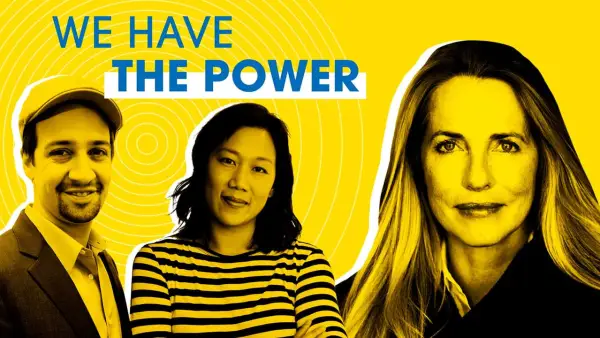
Let’s rethink giving
How can we reimagine philanthropy so that we create a future where there is justice and dignity for all? What are the root causes of the issues and how do we encourage the participation of many and not just a few?
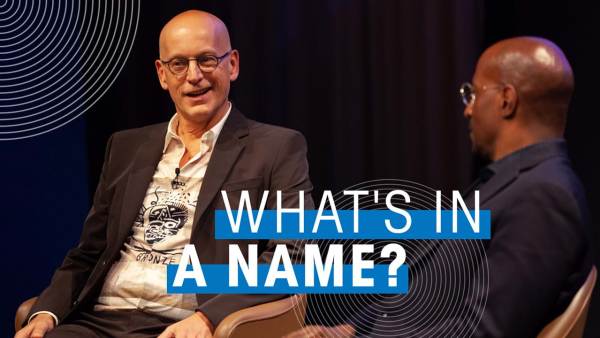
The power of a name featuring Jon Stryker and Van Jones
As a philanthropist, Jon Stryker, president of the Arcus Foundation, believes the act of naming gives power and influence to the work that is supported through his gifts. His philanthropy supports those on the frontlines of justice, providing resources and power to those who need it most.
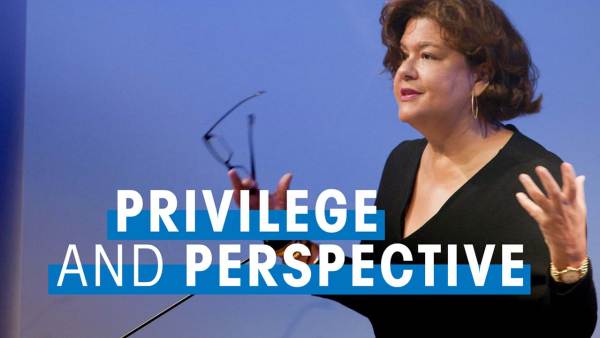
The privilege of perspective featuring Elizabeth Alexander
Elizabeth Alexander, president of the Andrew W. Mellon Foundation, on art, activism, and acknowledging adversity.
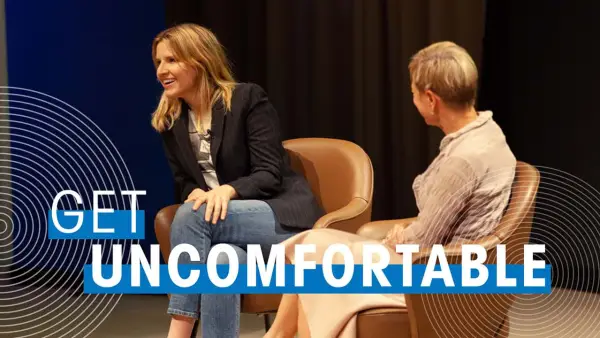
Getting proximate featuring Tara Westover and Hilary Pennington
Tara Westover, author of “Educated,” sees a disconnect between the rural and urban parts of the United States. She believes philanthropists need to be more proximate to the issues they care about, and that spending time with people who aren’t like you is key to disrupting inequality.
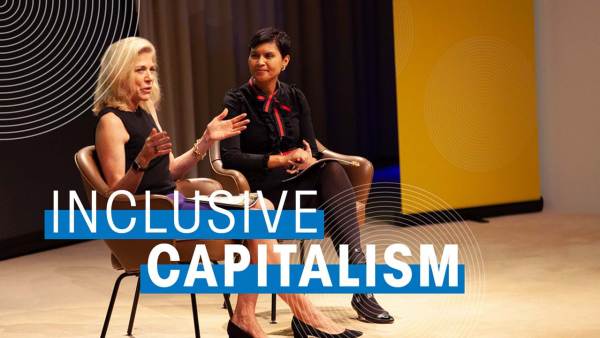
Can capitalism ever really be inclusive? featuring Lynn Forester de Rothschild and Stephanie Mehta
The top 1 percent of the United States controls 42 percent of the national wealth. Lynn Forester de Rothschild, founder of the Center for Inclusive Capitalism, explains that reimagining the economy and making it a sustainable, inclusive system that leads to strong economic growth requires reform.
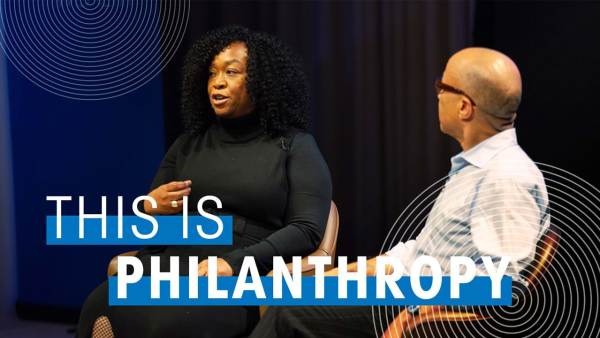
This is what a philanthropist looks like featuring Shonda Rhimes and Darren Walker
Writer and producer Shonda Rhimes has seen the power storytelling has to make change through her work, which centers marginalized people and issues. Rhimes believes philanthropy sets an example others can follow, and says supporting organizations that are already on the ground doing the work is key.
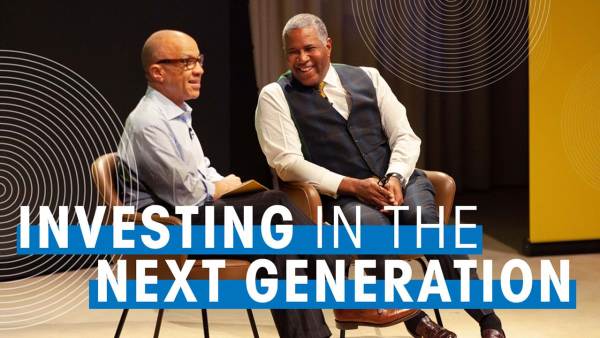
Catalyzing the potential of our time featuring Robert Smith and Darren Walker
Through philanthropy, Robert Smith, CEO of Vista Equity Partners, has alleviated the burden of student debt for a graduating class. He says private philanthropy can help address public policy challenges, such as student loan debt, and is a disruptive opportunity that liberates people to contribute to society in positive ways.
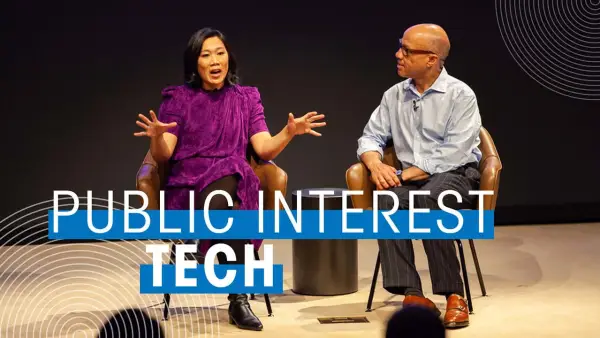
Tech funders changing philanthropy featuring Priscilla Chan & Darren Walker
The top 1 percent of the United States controls 42 percent of the national wealth. Lynn Forester de Rothschild, founder of the Center for Inclusive Capitalism, explains that reimagining the economy and making it a sustainable, inclusive system that leads to strong economic growth requires reform.
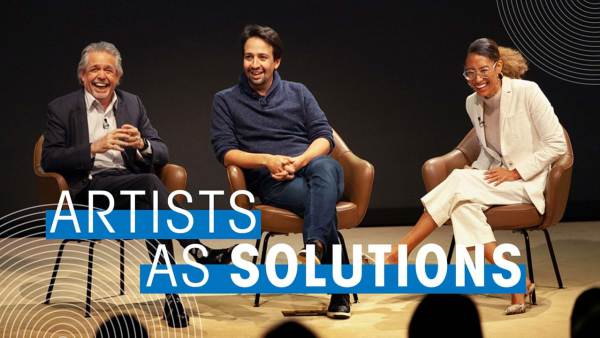
Why artists shouldn’t stay in their lane featuring Lin-Manuel Miranda, Luis Miranda Jr. and Elaine Welteroth
Composer and actor Lin-Manuel Miranda believes all art is political. He and his father, Luis A. Miranda Jr. of the MirRam Group, see the value philanthropy has to empower communities that may have been neglected, and allow them to share their stories through the arts, like Puerto Rico did after Hurricane Maria.
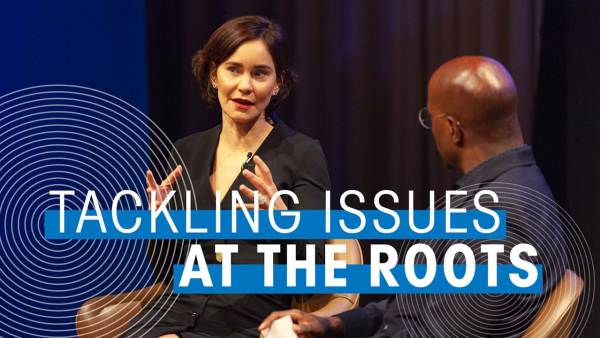
Good philanthropy needs government featuring Laura Arnold and Van Jones
Laura Arnold, co-chair of Arnold Ventures, believes policy change is the lever that will lead to sustainable change. She says we need to attack the systems that are creating the injustices we see, like criminal justice. Philanthropy can create better alternatives that governments can adopt.
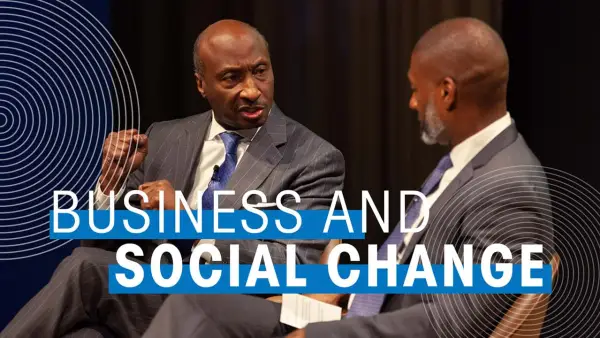
The business of justice featuring Kenneth Frazier and Charles Blow
Kenneth Frazier, CEO of Merck and Co, believes one of the greatest injustices in our society is the health disparities experienced by women of color. A zip code is more likely to determine health outcomes than genetic code. Frazier uses philanthropy to address mortality rate and wants to see more medical personnel listen to their women patients and patients of color.
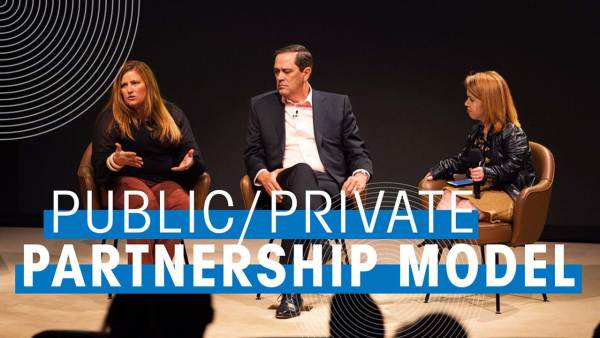
Public-private partnership: A new model for lasting impact featuring Jennifer Loving and Chuck Robbins
Jennifer Loving, CEO of Destination: Home, says a public-private partnership, like the one between her nonprofit and Cisco, headed by Chuck Robbins, can help create a model for the future of philanthropy, and tools like social bonds can help address some of the biggest crises of our time.
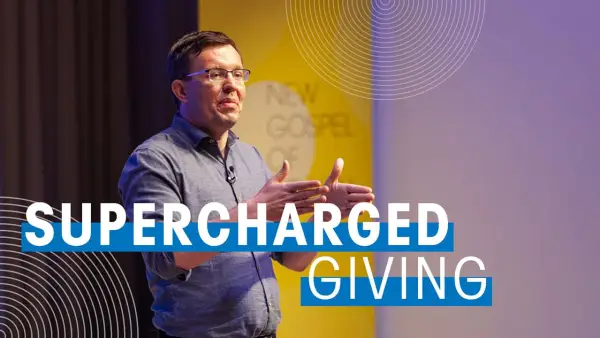
The new power of philanthropy featuring Henry Timms
CEO of Lincoln Center Henry Timms asks how philanthropy can supercharge civic engagement. Timms, who started Giving Tuesday, says trust-based philanthropy needs to shift from generosity to justice, driving more participation from more people, and encouraging meaningful ways to participate and collaborate.
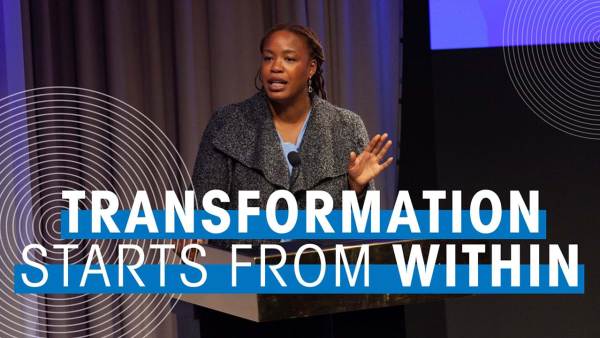
Transforming organizations from the inside featuring Heather McGhee
Heather McGhee, distinguished senior fellow at Demos, shares her experience of working to make the Demos think tank more diverse and led by people of color. Institutional racism, however slight, drives inequality, she says, so transformation needs to be a must-have and not a nice-to-have.
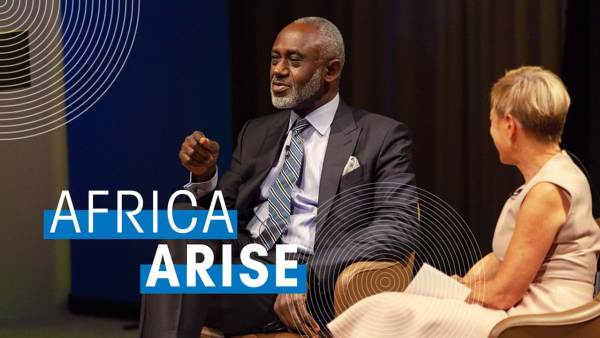
Africa, your time is now featuring Gbenga Oyebode and Hilary Pennington
Ford Foundation trustee Gbenga Oyebode has seen the value of impact investing on the African continent. He believes philanthropy should not just be giving, but investing with a social impact and an economic return. Giving is inherently part of African culture, but needs to be more strategic and collaborative.
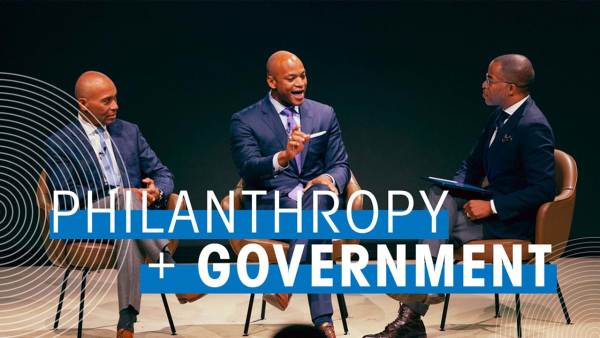
Why good government needs philanthropy featuring Deval Patrick and Wes Moore with Jonathan Capehart
Wes Moore, CEO of Robin Hood, and Deval Patrick, managing director of Bain Capital, see philanthropy working hand-in-hand with government in the fight for equality. Philanthropy can often provide the initial capital needed while government can take over and scale the solution.
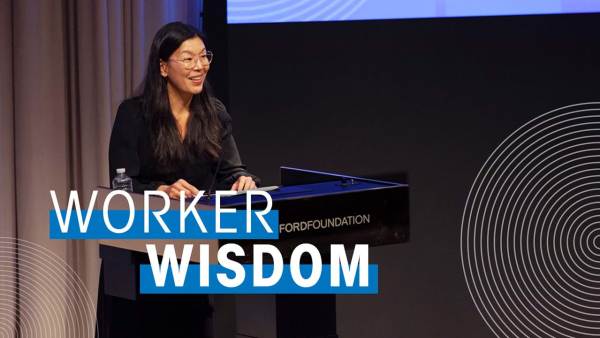
Bringing hidden labor to light featuring Ai-Jen Poo
Ai-jen Poo, executive director of the National Domestic Workers Alliance, says the sector of caregivers and domestic workers continues to grow. Building a future of work that works for all is centered on justice-based philanthropy and not a generosity model.
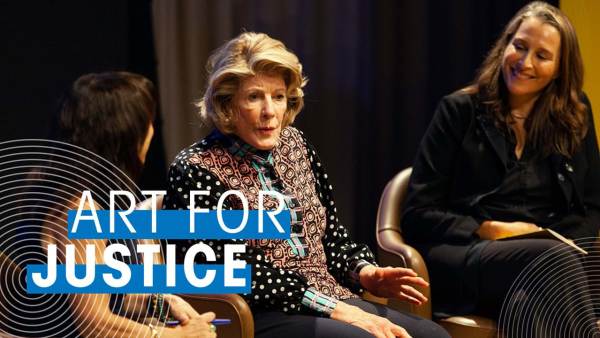
Art for Justice featuring Agnes Gund and Catherine Gund with Maria Hinojosa
The Art for Justice fund was created to help end mass incarceration. Founder Agnes Gund says philanthropy is about addressing issues like this. Catherine Gund believes art has an important part to play in the fight for racial justice and can help change the policies that led to mass incarceration.
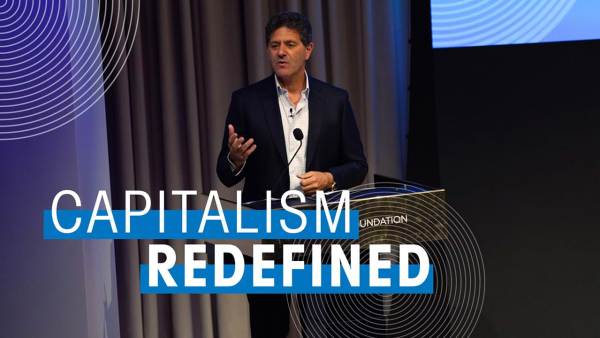
Capitalism redefined featuring Nick Hanauer
Entrepreneur Nick Hanauer asks us to reimagine the economy. He believes we need to change our beliefs about the economy to create a more just, more equitable society for all. By choosing better economic beliefs, we can change society for good.
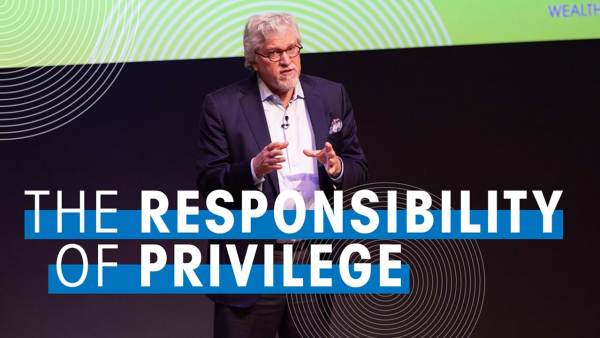
On using power and privilege for change featuring Jeff Raikes
Jeff Raikes, co-founder of the Raikes Foundation, says dismantling racism requires philanthropy to ditch its colorblind approach. People in power need to acknowledge that privilege is invisible to those who possess it. Privilege and power need to be transformed into a force for changing our society for the better.